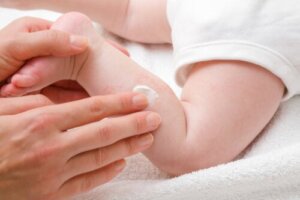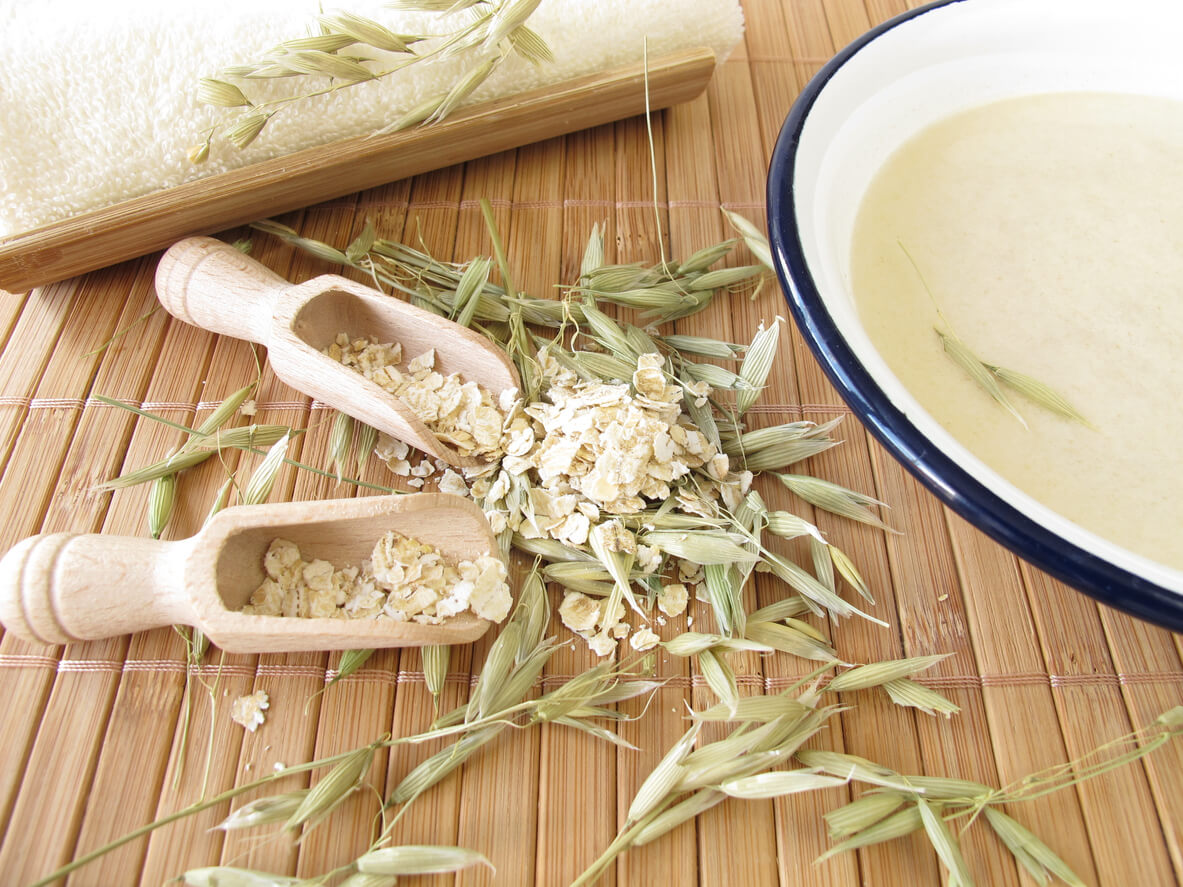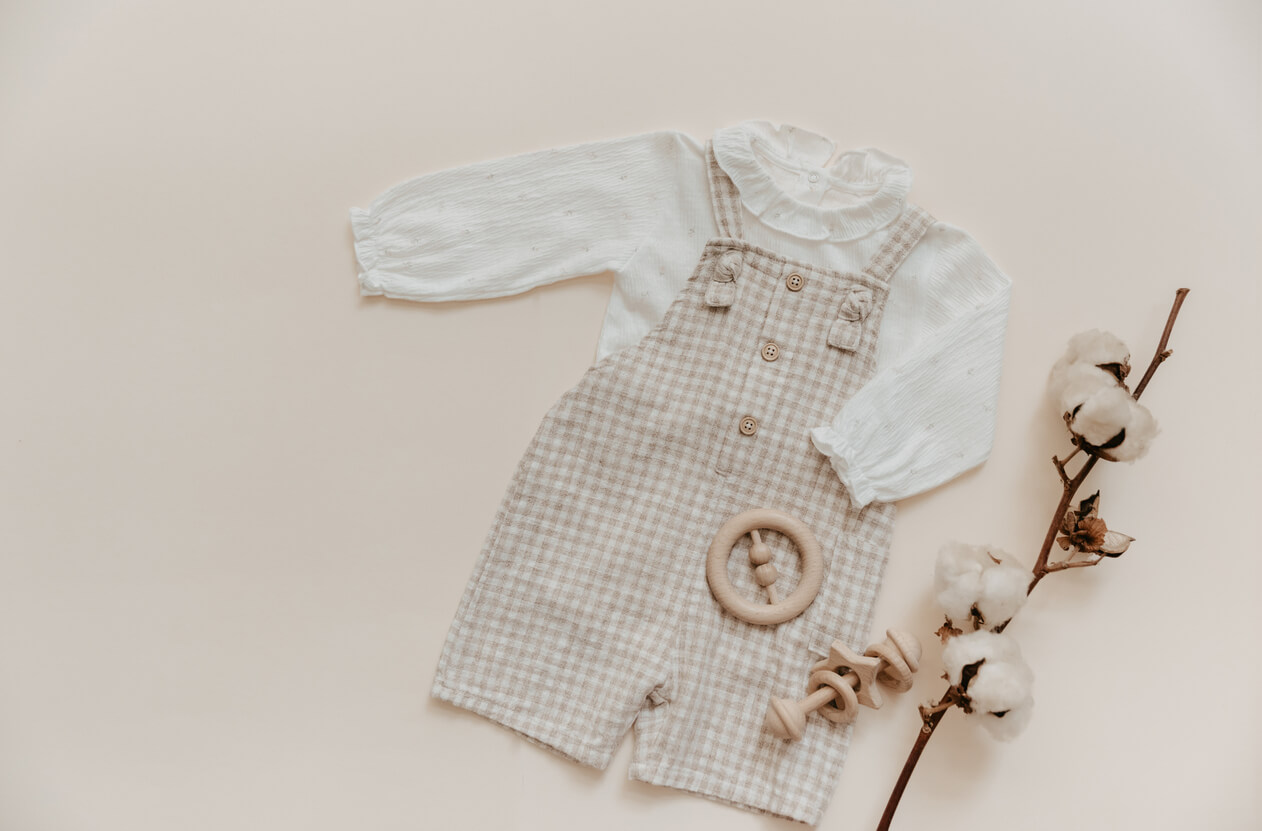10 Natural Remedies for Dry Skin in Babies

There are several natural remedies for dry skin in babies, although not all of them are suitable for use on newborns. This condition is very common in childhood and for this reason, we’re going to detail some non-pharmacological options to combat it. Take note!
Natural remedies for dry skin in babies
Dry skin in babies is often a big concern for parents, but some home remedies can be implemented to improve it.
1. Room humidifiers
To prevent dry skin in babies, it’s best to keep environments warm and slightly humid.
Humidifiers are devices designed to achieve a cool and pleasant environment that doesn’t dry out the skin or mucous membranes. Its effect not only keeps the skin surface hydrated but also makes emollients even more effective.
It should be noted that ultraviolet radiation and temperature aren’t the only external factors that affect the health of the skin. Humidity at its extreme levels determines the amount of water in the stratum corneum, which is the outermost layer of the epidermis.
2. Calendula
Calendula creams are used to stimulate wound healing and treat some skin conditions, including eczema. In turn, they help reduce inflammation, improve the texture and appearance of the skin’s surface, and eliminate surface bacteria.
It’s always advisable to opt for products containing natural extracts and without chemical additives in order to avoid irritation of the delicate skin of infants.
3. Essential oils
Essential oils are products derived from aromatic plants, which have beneficial biological properties and certain medicinal uses. Among them, avocado oil is one of the most moisturizing due to its high content of vitamin E, vitamin A, and fatty acids.
It’s worth clarifying that it’s important to be cautious when applying oils or creams to children’s skin, as it becomes more slippery and the chances of falls increase.
4. Colloidal oatmeal
Ground oatmeal, also known as colloidal oatmeal, is used quite often to soothe itchy and irritated skin. This is because, within its properties, its anti-inflammatory power and regulator of skin pH stand out.
Colloidal oatmeal baths are one of the simplest and cheapest methods of soothing dry skin in infants. According to a study recently published by the Journal of Drugs in Dermatology, this cereal repairs skin barrier defects and improves the composition of the microbiome that lives on its surface.

You may be interested: Caring for Your Newborn Baby’s Skin
5. Short and spaced baths
In babies with dry skin, it’s best to avoid baths too often. In fact, in general, most babies only require a bath once or twice a week.
In addition, when performing the bath, it’s important to take into account some recommendations:
- Prefer syndet soaps or mild cleansers.
- Don’t submerge the baby in the water for more than 10 minutes.
- Dry the skin with a cotton towel without generating friction.
6. Neutral and chemical-free soaps
According to a publication in the journal Pediatric Dermatology, newborn babies have drier skin than older children. Therefore, the use of appropriate cosmetic products helps them keep their delicate epidermis hydrated, protected, and undamaged.
Choosing any type of commercial oil or soap can alter the pH levels of the skin and cause eczema, irritation, or itchiness.
Likewise, according to a review published in the Journal of the European Academy of Dermatology and Venereology, the use of soft neutral soaps, of the syndet type, that don’t contain perfumes and that don’t produce too much foam, is recommended.
7. Probiotics
The use of probiotics helps maintain a balanced intestinal flora. In addition, it promotes the development of a healthy mucosa by regulating the number of intestinal bacteria.
This way, the administration of Lactobacillus GG in babies helps to reduce the risk of developing atopic dermatitis and maintain dry skin. However, the results aren’t immediate and sufficient time is required to produce cell turnover and balance of these microorganisms.
8. Aloe vera gel
This cosmetic product is a derivative of the aloe vera plant that’s used to soothe ailments, such as irritation from sunburn.
As detailed in a scientific study, aloe vera gel has important beneficial properties for health, such as the following:
- Prevents the development of bacteria and germs
- Stimulates the immune system
- Heals the wounds
9. Melaleuca Alternifolia
Tea tree oil is derived from the leaves of the Melaleuca alternifolia plant, one of the most widely used products for the treatment of various dermatological conditions, including eczema.
Its effectiveness is based on its healing, antibacterial, and anti-inflammatory properties. In addition, in this case, tea tree oil not only helps to improve the appearance of dry skin, but also to relieve itching. However, it is not recommended for babies under 6 months old.

10. Correct clothing
When you have dry skin, it’s best to opt for clothing made with 100% cotton or other natural fabrics. You can even opt for clothes that don’t contain chemical products in their preparation.
Some garments have certain seams or brand labels that are usually annoying for babies. Therefore, it’s advisable to cut or remove them to prevent possible reactions.
Basic care to prevent dry skin in babies
Natural remedies aren’t the only option for dry skin in babies, as there are also other care measures to keep the skin functional and preserve its protective barrier. Some of these strategies include the use of appropriate cosmetic products, regular skin cleansing, and constant moisturizing.
There are several natural remedies for dry skin in babies, although not all of them are suitable for use on newborns. This condition is very common in childhood and for this reason, we’re going to detail some non-pharmacological options to combat it. Take note!
Natural remedies for dry skin in babies
Dry skin in babies is often a big concern for parents, but some home remedies can be implemented to improve it.
1. Room humidifiers
To prevent dry skin in babies, it’s best to keep environments warm and slightly humid.
Humidifiers are devices designed to achieve a cool and pleasant environment that doesn’t dry out the skin or mucous membranes. Its effect not only keeps the skin surface hydrated but also makes emollients even more effective.
It should be noted that ultraviolet radiation and temperature aren’t the only external factors that affect the health of the skin. Humidity at its extreme levels determines the amount of water in the stratum corneum, which is the outermost layer of the epidermis.
2. Calendula
Calendula creams are used to stimulate wound healing and treat some skin conditions, including eczema. In turn, they help reduce inflammation, improve the texture and appearance of the skin’s surface, and eliminate surface bacteria.
It’s always advisable to opt for products containing natural extracts and without chemical additives in order to avoid irritation of the delicate skin of infants.
3. Essential oils
Essential oils are products derived from aromatic plants, which have beneficial biological properties and certain medicinal uses. Among them, avocado oil is one of the most moisturizing due to its high content of vitamin E, vitamin A, and fatty acids.
It’s worth clarifying that it’s important to be cautious when applying oils or creams to children’s skin, as it becomes more slippery and the chances of falls increase.
4. Colloidal oatmeal
Ground oatmeal, also known as colloidal oatmeal, is used quite often to soothe itchy and irritated skin. This is because, within its properties, its anti-inflammatory power and regulator of skin pH stand out.
Colloidal oatmeal baths are one of the simplest and cheapest methods of soothing dry skin in infants. According to a study recently published by the Journal of Drugs in Dermatology, this cereal repairs skin barrier defects and improves the composition of the microbiome that lives on its surface.

You may be interested: Caring for Your Newborn Baby’s Skin
5. Short and spaced baths
In babies with dry skin, it’s best to avoid baths too often. In fact, in general, most babies only require a bath once or twice a week.
In addition, when performing the bath, it’s important to take into account some recommendations:
- Prefer syndet soaps or mild cleansers.
- Don’t submerge the baby in the water for more than 10 minutes.
- Dry the skin with a cotton towel without generating friction.
6. Neutral and chemical-free soaps
According to a publication in the journal Pediatric Dermatology, newborn babies have drier skin than older children. Therefore, the use of appropriate cosmetic products helps them keep their delicate epidermis hydrated, protected, and undamaged.
Choosing any type of commercial oil or soap can alter the pH levels of the skin and cause eczema, irritation, or itchiness.
Likewise, according to a review published in the Journal of the European Academy of Dermatology and Venereology, the use of soft neutral soaps, of the syndet type, that don’t contain perfumes and that don’t produce too much foam, is recommended.
7. Probiotics
The use of probiotics helps maintain a balanced intestinal flora. In addition, it promotes the development of a healthy mucosa by regulating the number of intestinal bacteria.
This way, the administration of Lactobacillus GG in babies helps to reduce the risk of developing atopic dermatitis and maintain dry skin. However, the results aren’t immediate and sufficient time is required to produce cell turnover and balance of these microorganisms.
8. Aloe vera gel
This cosmetic product is a derivative of the aloe vera plant that’s used to soothe ailments, such as irritation from sunburn.
As detailed in a scientific study, aloe vera gel has important beneficial properties for health, such as the following:
- Prevents the development of bacteria and germs
- Stimulates the immune system
- Heals the wounds
9. Melaleuca Alternifolia
Tea tree oil is derived from the leaves of the Melaleuca alternifolia plant, one of the most widely used products for the treatment of various dermatological conditions, including eczema.
Its effectiveness is based on its healing, antibacterial, and anti-inflammatory properties. In addition, in this case, tea tree oil not only helps to improve the appearance of dry skin, but also to relieve itching. However, it is not recommended for babies under 6 months old.

10. Correct clothing
When you have dry skin, it’s best to opt for clothing made with 100% cotton or other natural fabrics. You can even opt for clothes that don’t contain chemical products in their preparation.
Some garments have certain seams or brand labels that are usually annoying for babies. Therefore, it’s advisable to cut or remove them to prevent possible reactions.
Basic care to prevent dry skin in babies
Natural remedies aren’t the only option for dry skin in babies, as there are also other care measures to keep the skin functional and preserve its protective barrier. Some of these strategies include the use of appropriate cosmetic products, regular skin cleansing, and constant moisturizing.
All cited sources were thoroughly reviewed by our team to ensure their quality, reliability, currency, and validity. The bibliography of this article was considered reliable and of academic or scientific accuracy.
- Akhtar N, Zaman SU, Khan BA, Amir MN, Ebrahimzadeh MA. Calendula extract: effects on mechanical parameters of human skin. Acta Pol Pharm. 2011 Sep-Oct;68(5):693-701. PMID: 21928714.
- Maharjan H. Radha, Nampoothiri P. Laxmipriya, Evaluation of biological properties and clinical effectiveness of Aloe vera: A systematic review, Journal of Traditional and Complementary Medicine, Volume 5, Issue 1, 2015, Pages 21-26,
ISSN 2225-4110, https://doi.org/10.1016/j.jtcme.2014.10.006. - Capone K, Kirchner F, Klein SL, Tierney NK. Effects of Colloidal Oatmeal Topical Atopic Dermatitis Cream on Skin Microbiome and Skin Barrier Properties. J Drugs Dermatol. 2020 May 1;19(5):524-531. PMID: 32484623.
- Saijo S, Tagami H. Dry skin of newborn infants: functional analysis of the stratum corneum. Pediatr Dermatol. 1991 Jun;8(2):155-9. doi: 10.1111/j.1525-1470.1991.tb00308.x. PMID: 1923986.
- Blume-Peytavi U, Cork MJ, Faergemann J, Szczapa J, Vanaclocha F, Gelmetti C. Bathing and cleansing in newborns from day 1 to first year of life: recommendations from a European round table meeting. J Eur Acad Dermatol Venereol. 2009 Jul;23(7):751-9. doi: 10.1111/j.1468-3083.2009.03140.x. PMID: 19646134.
This text is provided for informational purposes only and does not replace consultation with a professional. If in doubt, consult your specialist.








